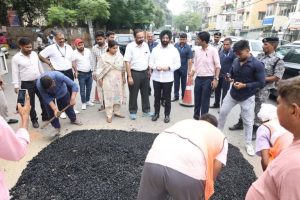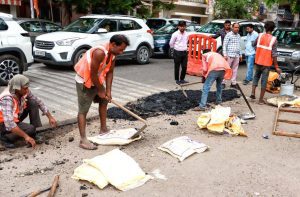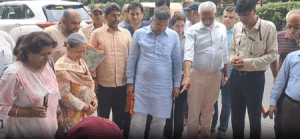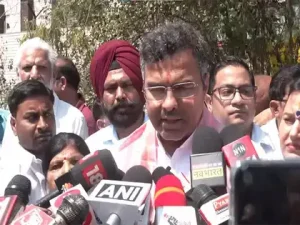New Delhi – The Delhi government’s Public Works Department accomplished an extraordinary feat on Tuesday, successfully repairing 3,433 potholes across the capital in a comprehensive single-day operation. This massive infrastructure initiative demonstrates the Delhi PWD’s commitment to improving road conditions before the monsoon season arrives.
The Delhi PWD’s ability to mobilize such extensive resources within a 24-hour timeframe highlights the department’s operational capabilities and dedication to public service. This remarkable accomplishment sets new standards for municipal infrastructure projects across India, demonstrating that ambitious goals can be achieved through proper coordination, adequate resource allocation, and strong political will backing essential public works initiatives.
Massive Scale Operation Across Delhi

The extensive repair drive covered the entire Delhi PWD road network, encompassing arterial routes, internal lanes, and accident-prone stretches throughout the city. This comprehensive approach ensured that no critical road segment was overlooked during the intensive repair campaign.
The Delhi PWD coordinated this ambitious project with remarkable precision, deploying resources strategically across three major zones – east, south, and north Delhi. Each zone received dedicated attention to ensure uniform coverage and quality repairs throughout the capital.
Strategic Resource Deployment


The Delhi PWD mobilized over 1,000 workers for this unprecedented operation, supported by 200 maintenance vans equipped with advanced compactors and ready-mix material. This substantial workforce demonstrated the department’s capacity to execute large-scale infrastructure projects efficiently.
Also Read: NDMC 25 Year Water Masterplan: Powerful Infrastructure Revolution Begins
Supervision was provided by 70 assistant engineers and 150 junior engineers, ensuring quality control and proper execution of repairs. The Delhi PWD’s systematic approach meant each pothole required approximately 20 minutes to complete, maintaining consistency throughout the operation.
Minister’s On-Ground Monitoring


PWD Minister Parvesh Verma personally monitored the drive, visiting multiple sites including Saket to review early morning progress. His hands-on approach reflected the Delhi PWD’s commitment to transparency and accountability in public infrastructure projects.
“By 11am, we had filled half the targeted potholes. Our aim is to give Delhi good roads once again,” Verma stated during the morning inspection. His presence at various sites ensured that the Delhi PWD teams maintained high standards throughout the operation.
Technology-Driven Identification Process
The Delhi PWD employed sophisticated methods to identify potholes requiring repair. Citizen complaints, zonal surveys, and drone mapping were utilized in the day leading up to the drive, ensuring comprehensive coverage of problem areas.
Each repair was meticulously documented with geo-tagged, time-stamped photographs to ensure transparency and accountability. This technological approach demonstrates how the Delhi PWD is modernizing its operations to serve citizens better.
Addressing Historical Road Quality Issues


Minister Verma highlighted the contrast between current and previous road conditions, noting that Delhi was once known for its superior road quality. The Delhi PWD’s current initiative aims to restore this reputation through systematic improvements.
“Delhi used to be known for its good roads and people going out of Delhi’s boundaries would realise that they have left Delhi. But now, you can tell you’ve entered Delhi because of the potholes. We’re reversing that,” Verma explained, emphasizing the Delhi PWD’s transformation goals.
The minister attributed current road conditions to poor construction practices by earlier administrations, highlighting the need for the Delhi PWD’s comprehensive approach to infrastructure renewal.
Long-Term Infrastructure Development

Beyond immediate pothole repairs, the Delhi PWD has outlined ambitious long-term road redevelopment plans. Approximately 150 kilometers of road network has already been completely recarpeted, with work progressing on another 100 kilometers.
The Delhi PWD has established a target of redeveloping around 500 kilometers of road network by March 2026. This extensive recarpeting program will significantly reduce future pothole formation and improve overall road quality.
“With the revamp of road network, the potholes will significantly go down,” the minister emphasized, connecting the Delhi PWD’s current repairs to broader infrastructure improvements.
Monsoon Preparedness Strategy
The timing of this repair drive was strategically planned considering the approaching monsoon season. The Delhi PWD recognized that potholes become particularly dangerous during rains, especially for two-wheeler riders who face increased accident risks.
“Potholes are known to become safety hazards during rains, especially for two-wheeler riders. With this timely repair drive, the government aims to significantly reduce accident risks, waterlogging complaints, and commuter discomfort,” Verma stated.
The Delhi PWD’s proactive approach to monsoon preparation demonstrates forward-thinking infrastructure management that prioritizes citizen safety and comfort.
Political Leadership Involvement


MLAs and ministers were strategically deployed in their respective constituencies to oversee progress during the operation. This political involvement ensured that the Delhi PWD’s efforts received proper oversight and support at the grassroots level.
This coordinated approach between political leadership and the Delhi PWD’s technical teams created a comprehensive monitoring system that enhanced the operation’s effectiveness and accountability.
Safety and Efficiency Focus
The Delhi PWD’s emphasis on safety extended beyond immediate repairs to long-term accident prevention. By addressing potholes before the monsoon, the department aims to reduce waterlogging complaints and improve overall commuter experience.
The strategic timing of repairs demonstrates how the Delhi PWD is evolving from reactive maintenance to proactive infrastructure management, anticipating problems before they become critical.
Future Infrastructure Vision
This single-day achievement represents a significant milestone in the PWD’s broader infrastructure transformation agenda. The department’s ability to coordinate such extensive operations indicates its capacity for larger future projects.
The PWD’s integration of technology, strategic planning, and massive resource deployment sets a precedent for future infrastructure initiatives. This approach could serve as a model for other urban infrastructure departments.
The successful completion of 3,433 pothole repairs in one day showcases the PWD’s operational efficiency and commitment to citizen welfare. This achievement marks a crucial step toward restoring Delhi’s reputation for quality road infrastructure while preparing the city for the challenging monsoon season ahead.

